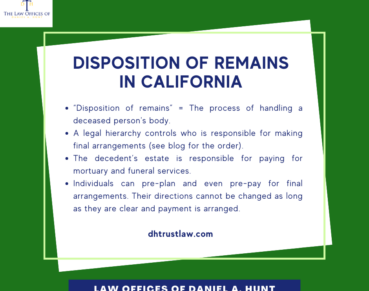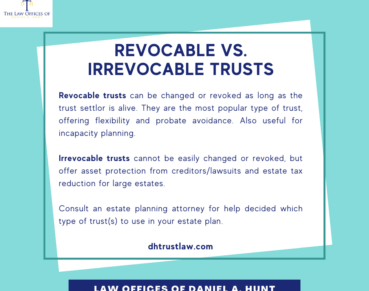What are the Duties of an Estate Executor in California?
You have recently found out that a friend or a family member appointed you as the executor of his or her estate in the will. You are probably feeling honored that your loved one would trust you to execute their estate. Or, you might have concerns about fulfilling your duties as an estate executor. After all, you have your own work and responsibilities.
If you are not in the same state as the person who passed away, the geographic boundaries will add another layer of complication. Understanding the role of an estate executor will help you best fulfill your duties.
You are Not Required to Accept Your Nomination as an Estate Executor
You have been nominated as an estate executor in California, but you are not sure that you have the time and ability to fulfill your duties. If you cannot perform your duties, you may need to recuse yourself from your duties as an estate executor. When you refuse to accept the appointment as an estate executor, a Sacramento probate court will appoint a different person.
What Does Acting as an Estate Executor Entail?
The amount of work that will go into acting as an estate executor depends on several factors. When the deceased individual has a relatively simple estate and nobody challenges the will, the process can go quite smoothly. On the other hand, when the estate is complicated, or family members plan on contesting the will, you could become entangled in a years-long process.
For example, adult children have sued years, or even a decade or more after the creator of the will passed away. In some cases, children who are beneficiaries only learn about potential fraud from executors decades after the fraud occurred. The legal duties associated with being an estate executor can last for years. If you are unsure as to whether you can meet your obligations, we recommend speaking with an experienced Sacramento will and estate lawyer as soon as possible.
The Process of Becoming an Executor
Typically, a person nominates someone to act as the estate executor in his or her will. The court formally appoints the executor after a scheduled hearing, however. The executor and all interested parties will receive notice of the hearing. They can raise their objections to the executor at the hearing.
Once the court appoints the executor, the executor will assume the fiduciary duties. The executor will need to comply with the terms of the will and the legal requirements imposed by the state of California. The court can appoint more than one executor, but in that case, each executor is jointly and severally liable to perform the duties of the executor.
Once the court has appointed someone as the executor, the person will remain in the role until the court discharges him or her. The court will not discharge the executor unless doing so will not harm the beneficiaries of the will.
Executors Owe Beneficiaries a Fiduciary Duty
Executors of a will owe the beneficiaries of the will a fiduciary duty, which is the highest duty known in the law. As an executor, you will owe the beneficiaries of the will the same duty of care and good faith that a spouse owes a spouse and a parent owes a child.
You will be required to ensure that you provide the beneficiaries with the highest degree of protective action to make sure that the beneficiaries are protected. The estate executor cannot engage in any type of fraud, dishonesty, or take action that only benefits himself or herself rather than the beneficiaries.
The Practical Duties of the Estate Executor
Once a California probate court appoints an executor to run the estate, he or she will begin managing the estate for the benefit of the beneficiaries. The executor needs to pay any debts owed by the estate. He or she needs to make sure that the estate has paid all taxes.
After paying the debts and caring for the assets of the estate, the executor will oversee the distribution of the remaining estate assets to the beneficiaries. The distribution of assets must happen in compliance with the will. Typical duties of the estate executor include the following:
- Finding all of the assets of the estate and taking care of the assets
- Paying any expenses necessary to maintain the assets
- Paying any income taxes that the deceased person might have owed on assets in the estate
- Paying any continuing expenses that are necessary to keep the assets of the estate secure, such as utility bills, insurance, and mortgage payments
- Paying any other types of taxes that are legally due
- Managing the day-to-day details of the estate, such as terminating leases and managing any other outstanding contracts
- Notifying any banks and government agencies of the death of the testator
- Paying any California estate taxes that are due
- Supervising the distribution of assets and filing the necessary petitions with the court
- Creating an estate bank account and brokerage accounts as necessary to keep income flowing during the life of the estate.
- Supervising the process of distributing the assets
- Filing any necessary petitions with the California probate court
- Locating heirs of the testator and advising them of the status of the estate, including filing the requisite notices
How Does the Executor Know What to Do?
The executor often hires various professionals necessary to help him or her perform many of the duties mentioned above. The estate will pay for these experts, which include accountants, property managers, attorneys, and insurance brokers. The estate will pay the reasonable cost of these professionals. Many courts will allow the executor to draw reasonable compensation from the assets in the estate.
Contact an Experienced California Will and Estate Lawyer
If you have learned that you have been appointed as an Executor, it is important to speak with a skilled lawyer. At the Law Office of Daniel Hunt, we can advise you as to the best way to proceed. Contact our law firm as soon as possible to schedule your initial consultation.
Law Offices of Daniel A. Hunt
The Law Offices of Daniel A. Hunt is a California law firm specializing in Estate Planning; Trust Administration & Litigation; Probate; and Conservatorships. We've helped over 10,000 clients find peace of mind. We serve clients throughout the greater Sacramento region and the state of California.




